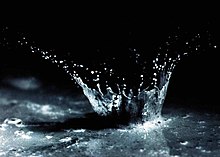潮土油
| 此條目目前正依照en:Petrichor上的内容进行翻译。 (2019年3月29日) |
潮土油[1][2](英語:petrichor)是指雨水落在乾燥土壤上时产生的气味、下雨時泥土的芳香[3],或“初雨味”。

英語 petrichor 來自希腊神话的古希臘語 πέτρα(pétra,岩 rock),或 πέτρος(pétros,石 stone),以及 ἰχώρ(ikhṓr,以太液[4][5],天神的血,希臘神話中在神的血管內流動的體液);其意思就是“刚下雨时,会闻到来自岩石逸出神的血”[6]。
起源 编辑
这个术语是由两位澳大利亚CSIRO研究人员,Isabel 'Joy' Bear和Richard G. Thomas,在1964年为在《自然》杂志上发表的一篇文章创造的[7][8]。根据该篇文章的描述,这种气味产生于某些植物在干旱期间渗出的油,这些油分泌后被黏土和岩石吸收。下雨时,这种油与土臭素(某些放线菌的代谢副产物)一起释放到空气中,产生独特的气味。如果下雨伴随闪电,这些气味中也可能含有臭氧[9]。Bear和Thomas(1965)的一篇后续文章表明,这种油会阻碍种子萌发和早期植物生长[10]。
机制 编辑
参见 编辑
引用 编辑
- ^ 波斯克, 比昂卡. 侍酒之人. 行路. 2018-03-06 [2019-04-01]. ISBN 9789869406987. (原始内容存档于2019-08-19) (中文(繁體)).
- ^ 【為什麼下過雨之後,地上會有個怪味?】. 《BBC知識》國際中文版14期〈Q&A〉. 《BBC知識》國際中文版. 2014-10-15 (中文(繁體)).
- ^ https://dictionary.cambridge.org/zht/%E8%A9%9E%E5%85%B8/%E8%8B%B1%E8%AA%9E-%E6%BC%A2%E8%AA%9E-%E7%B9%81%E9%AB%94/petrichor
- ^ 曹则贤. 物理学咬文嚼字. Global Publishing. 2010: 61 [2023-06-21]. ISBN 9789813205666. (原始内容存档于2023-06-21).
- ^ 王煜. 中國學術思想論叢. 明文書局. 1994: 30,449 [2023-06-21]. ISBN 9789577030351. (原始内容存档于2023-06-21).
- ^ 西蒙‧金(Simon King), 克萊爾‧納西爾(Clare Nasir). 李文堯, 林心雅, 田昕旻 , 编. 氣象大解密—觀天象、談天氣,解惑常見的101個氣象問題. 晨星出版. 2021. ISBN 9786267009789.
- ^ Bear, Isabel Joy; Thomas, Richard G. Nature of argillaceous odour. Nature. March 1964, 201 (4923): 993–995. Bibcode:1964Natur.201..993B. doi:10.1038/201993a0.
- ^ Garg, Anu. The Dord, the Diglot, and an Avocado Or Two: The Hidden Lives and Strange Origins of Words. Penguin. 2007: 399 [2019-03-29]. ISBN 9780452288614. (原始内容存档于2021-03-19).
- ^ Yuhas, Daisy. Storm Scents: It's True, You Can Smell Oncoming Summer Rain: Researchers have teased out the aromas associated with a rainstorm and deciphered the olfactory messages they convey. Scientific American. July 18, 2012 [July 20, 2012]. (原始内容存档于2017-05-09).
- ^ Bear, Isabel Joy; Thomas, Richard G. Petrichor and plant growth. Nature. September 1965, 207 (5005): 1415–1416. Bibcode:1965Natur.207.1415B. doi:10.1038/2071415a0.